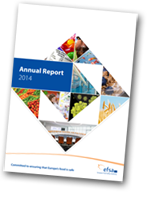Looking for a fast and robust method to analyse anionic pesticides in fruits and vegetables? If so, then this presentation is just what you need...

 Highly polar pesticides (glyphosate, AMPA, fosetyl-aluminum, etc.) are particularly challenging analytes to study. They have very low extractability in typical multiresidue methods, such as QuEChERS, ethyl acetate methods and miniLuke. Additionally, their retention in the reversed phase liquid chromatography columns that are used for the majority of pesticide analysis, is generally poor and unstable. Using highly polar solvents, such as methanol or methanol and water, can help solve problems with extractability. One approach to addressing poor retention is derivatization. However, derivatization is time consuming and not all compounds can be derivatized.
Highly polar pesticides (glyphosate, AMPA, fosetyl-aluminum, etc.) are particularly challenging analytes to study. They have very low extractability in typical multiresidue methods, such as QuEChERS, ethyl acetate methods and miniLuke. Additionally, their retention in the reversed phase liquid chromatography columns that are used for the majority of pesticide analysis, is generally poor and unstable. Using highly polar solvents, such as methanol or methanol and water, can help solve problems with extractability. One approach to addressing poor retention is derivatization. However, derivatization is time consuming and not all compounds can be derivatized.
As noted in the last European Food Safety EFSA 2014 report, these analytical challenges mean that many routine laboratories do not have the capabilities necessary to determine polar pesticide compounds.
When: 6 July, 2017
Start Time: 07.00 PDT / 10.00 EDT / 15.00 BST / 16.00 CEST
 In this webinar, Łukasz Rajski, who works in the laboratory of Dr. Amadeo R. Fernández-Alba at the University of Almería in Spain, will talk about the application and evaluation of ion chromatography coupled to Orbitrap mass spectrometry for multiresidue detection of polar pesticides in fruits and vegetables. The validated method he will present is fast and easy to implement for routine analysis. In all cases, it provides adequate LOQs relative to EU MRLs and the linearity, retention time variation, mass accuracy and repeatability meet the most stringent criteria of Quality Control performance for routine food control.
In this webinar, Łukasz Rajski, who works in the laboratory of Dr. Amadeo R. Fernández-Alba at the University of Almería in Spain, will talk about the application and evaluation of ion chromatography coupled to Orbitrap mass spectrometry for multiresidue detection of polar pesticides in fruits and vegetables. The validated method he will present is fast and easy to implement for routine analysis. In all cases, it provides adequate LOQs relative to EU MRLs and the linearity, retention time variation, mass accuracy and repeatability meet the most stringent criteria of Quality Control performance for routine food control.
By attending this presentation you will learn about...
- the challenges of analyzing polar pesticides
- a fast and easy, validated method for routine analysis of polar pesticides
- the benefits of using ion chromatography with HRAM mass spectrometry
This webinar is highly recommended if you work in:
- EU Reference Laboratories (EURL-FV) performing polar pesticide analysis on fruits and vegetables
- National Reference Laboratories for Fruits and Vegetables, and for Single Residue Methods
- Food and beverage labs performing polar pesticide analysis for regulatory compliance



